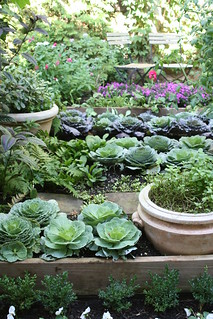You may have heard the saying, "have your cake and eat it too." With a potager you have your garden and eat it too!
Potagers are a great option for people who live on smaller lots of land or only have room for a small garden. They are also great for people who just don't have the time to tend a larger garden but like to have some color in their yard and fresh vegetables at the same time.
So just what is a potager?
Depending on who you ask, there are a few different definitions of what a potager is supposed to be - ranging from an organized display vegetable garden to a combination of edible plants and display plants.
If you've never heard the term before, essentially a potager is making use of the colors and textures of vegetables to create a colorful display garden with the added benefit of being able to eat the plants in it, and that is why it is considered the ultimate garden by some - it is pleasing to both the eye and the stomach!
With many flowers finding their way into salads and other forms of foods as people become aware of the fact that they are edible, the potager has become more popular in recent years.
By adding sculptures, pots, specimen trees and anything else that you would add to a normal flower garden, the potager can become a focal point in any garden and your vegetables no longer need to be hidden away out of sight in some other part of your property.
Most potagers are grown in raised beds that allow better control over the drainage and reduce the chance of the vegetables becoming waterlogged. Raised beds also allow the soil to warm faster in the spring, create ease of access, and offer a neat look.
By planning your sustainable vegetable garden in a structured manner, and making use of contrasting colors and textures of leaves, foliage, and vegetables, you can create a display that will rival any flower garden.
It can be quite a fun and exciting challenge to create an eye-catching potager. If you only have a small area for gardening, and want to try something a bit different with your available space, why not try a potager this garden season?
Check Out These Resources for More On Creating A Potager:


















